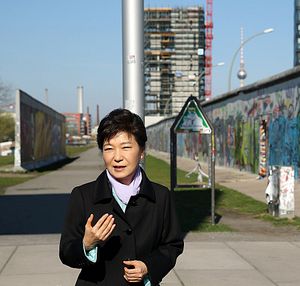On December 24, Gallup Korea released its end of the year “daily opinion” survey findings for presidential approval (and disapproval). The year-end data show, somewhat surprisingly, President Park Geun-hye’s performance is more favorably assessed than many might think. Despite a number of cabinet scandals, the MERS outbreak, the history textbook controversy, and contentious labor protests, Park Geun-hye has managed to end the year more popular than she began it.
The December poll shows the percentage of those who think Park Geun-hye is doing well as president at 43 percent (46 percent think she is preforming poorly). While more disapprove than approve, her approval rating is higher than it was at the end of 2014 (when it was at 40 percent) and, more notably, is significantly higher than it was earlier in the year. According to the Gallup data, the president’s approval rating hit rock bottom in February at 33 percent. After another cabinet scandal and a revised tax law that put the squeeze on middle class workers, some speculated Park had entered, prematurely, a lame duck period in her third year. (South Korean presidents tend to reach this point sometime in year four of the five year term.)
At this point in her presidency (entering year four), Park enjoys a reasonable base of popular support. This support, however, is not equally distributed. The age cohort differences are significant. For the 19-29 age cohort, the approval rating has rested at a chilly 18 percent. Those 60 and above have a different opinion; the approval rating for this age cohort plateaued at 77 percent (making for a 55pp difference). While not as supportive as the oldest cohort, most of those in their 50s approve of President Park’s performance (59 percent). The 40s age cohort is not as supportive (35 percent) and those in their 30s are significantly less so (23 percent). Whether the age cohort differences are issue-specific, the product of generational effects, or due to life-cycle effects (the tendency for people to become politically conservative as they age) is an open question. The pattern suggests life-cycle effects, but that is far from proven.
It is impossible to know what 2016 has in store for the Blue House; presidential approval ratings, vulnerable to the gusts of popular feeling, are prone to sudden shifts. Though still popular today, Park could find herself the object of popular scorn tomorrow. Consider, for example, the late President Roh Moo-hyun. Entering his last year of office, his approval rating stood at 11 percent (!). As the cohort breakdown suggests, the older cohort in South Korea will likely determine how (un)popular Park Geun-hye will be in 2016.

































